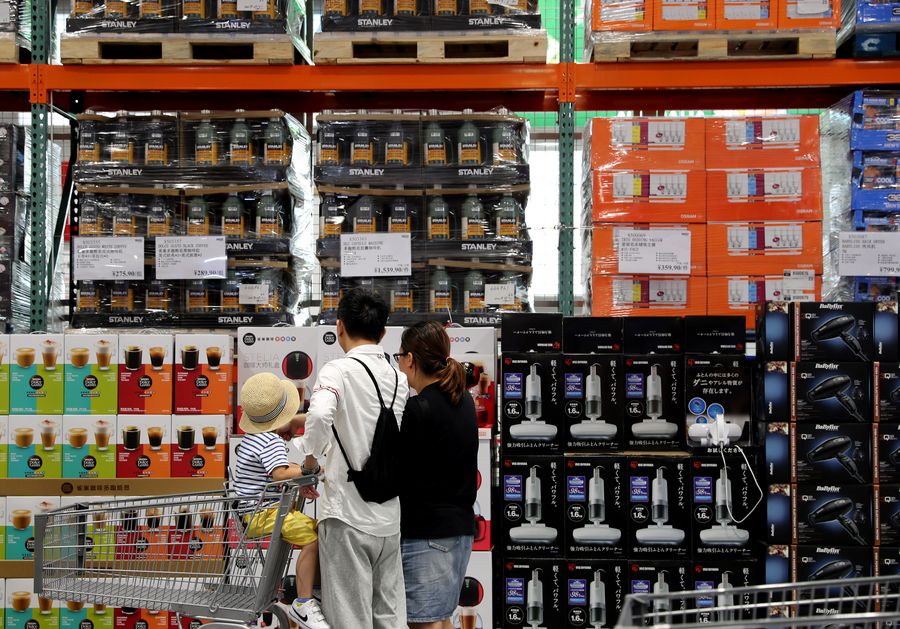
Customers shop at U.S. retail giant Costco Wholesale's first brick-and-mortar store in east China's Shanghai, Sept. 19, 2019. (Xinhua/Liu Ying)
Foreign retailers are expanding their presence and navigating their strategies in China. China shows the commitment in further opening up and creating an increasingly prosperous market.
by Xinhua writers Zheng Xin, Jiang Jiang and Chen Aiping
BEIJING, Dec. 7 (Xinhua) -- Foreign retailers are expanding their presence and navigating their strategies in China as the country aims for wider opening-up as its consumers pursue high-quality products.
Facing the complicated situation of rising risks and challenges both at home and abroad this year, China has maintained sustained and sound economic and social development.
A meeting of the Political Bureau of the Communist Party of China (CPC) Central Committee Friday emphasized the importance of deepening reforms in the economic system to achieve a higher level of opening-up.
For foreign retailers and local consumers, this meeting demonstrated China's commitment in further opening up and creating an increasingly prosperous market while the world economy is mired in sluggish growth.
AN OPEN MARKET
Since the beginning of this year, a slew of international companies including Adidas, Nike and Lego have opened new flagship stores in major Chinese cities, while German supermarket chain ALDI entered the Chinese mainland market and Lawson convenience stores swept across third- and fourth-tier cities, according to the Ministry of Commerce.
Such trends demonstrate that China remains one of the most important yet challenging consumer markets that many retailers simply cannot afford to ignore, and Chinese consumers are increasingly discerning as they continue to demand a better customer experience.
Two years after debuting in China, German discount supermarket chain ALDI officially launched its first pilot stores in Shanghai on June 7, followed by three more launched in October, which were customized and tailored specifically to meet consumers' needs.
"Chinese consumers' enthusiasm and support strengthened our confidence in long-term development here," said Yougang Chen, president of ALDI China, adding that the newly-launched stores will help expand the range of services.
Walmart China plans to accelerate its expansion by opening more than 500 new stores and "depots" (smaller warehouses) in the next five to seven years and updating 200 existing stores in three years, according to a press release.
Net sales of Walmart China increased 6.3 percent in the third quarter with its comparable sales up 3.78 percent, setting a record for the past five years.
Overseas retail companies' interest in expanding their market in China has also been fueled in part by the second China International Import Expo, which sent a strong signal about China's commitment to wider opening up.
LEGO Group CEO Niels B. Christiansen told Xinhua that China is seen as the group's "strategic growth market," which recorded double-digit growth in consumer sales in the first six months.
The company has partnered with Chinese e-commerce platforms like Alibaba to boost its sales and branding. It also teamed up with tech giant Tencent to soft-launch the children's mobile game LEGO Cube.

People view miniature of landmarks made of Lego bricks at the Legoland Discovery Center in Shenyang, capital of northeast China's Liaoning Province, Jan. 15, 2019. (Xinhua/Long Lei)
A SPECIAL MARKET
Why is China's retail landscape so different? A basic fact is that China's upgrading consumption structure is gravitating the retail industry toward an emphasis on convenience, diversity and hands-on experience.
China is mobile-first, and mobile payments have fueled the e-commerce revolution in China. With mobile payment penetration at 86 percent, the country is virtually cashless, according to a report by research firm Gartner L2.
"Mobile payments facilitate both online and offline commerce, provide access and purchasing power to the unbanked and have transformed consumer engagement across the board," said the report, which also highlighted China's pace of innovation, tech giant's impact on retail, the prevailing same-day delivery and shopping-as-entertainment through live-streaming.
Adaptation to the rapidly changing market is high on the agenda. ALDI's new stores in Shanghai feature an integrated online to offline retail experience through the "Scan & Go" function on its WeChat mini-program and instant delivery services within three kilometers of the stores.
METRO AG, a leading international company in wholesale and food retail, in October agreed to a transaction and strategic partnership with Wumei Technology Group (Wumei), whereby METRO AG will sell its entire stake in METRO China and receive a 20 percent stake in a resulting joint venture.
"After assessing various options, we have chosen a path that will further strengthen METRO China's role for consumers," said Olaf Koch, CEO of METRO AG.
Wumei and its technology partner Dmall will bring "new retail" expertise that blends offline and online services which will benefit METRO China by expanding its customer reach and accelerating growth in China's rapidly evolving market.
"The retail market is mainly driven by two factors: demand and technological innovation," Chen Xinkang, head of the Shanghai Marketing Association, told Xinhua in an interview.
"China is seeing an obvious trend of trading-up. In the meantime, the development of retail will be affected by big data technology and intelligent technology, as more innovations will be seen in terms of customized, convenient and intelligent business models," Chen said.
SHARED OPPORTUNITIES
"In just over 20 years, China's retail market has completed the evolution that took European and American markets nearly 80 years," Chen said, noting that local retail enterprises are now fully capable of competing with foreign firms.
China's retail sales of consumer goods amounted to 33.48 trillion yuan (about 4.76 trillion U.S. dollars) in the January-October period, up 8.1 percent year on year. Excluding sales of automobiles, the growth rate reached 9 percent during this period, NBS data showed.
Gartner L2 predicted that China's total retail sales of 2019 will reach 5.6 trillion U.S. dollars, surpassing America to become the largest retail market in the world.
With China's opening up expanding, retail enterprises from all over the world have entered the Chinese market and enriched the choices of the Chinese people, raking in great opportunities at the same time, said Bai Ming, an expert with a research institute affiliated to China's Commerce Ministry.
"The upgrading of Chinese consumption and enterprises from other countries seeking greater development opportunities in China are mutually promoting," Bai said. "Giving up the huge consumer market would mean self-inflicted damage."
Gartner L2 advised foreign retailers to take China as a digital laboratory to identify what can be transferrable to the West, experiment with emerging social commerce offerings and develop a holistic digital strategy for offline activations.
"Visit China to see the retail developments firsthand," the research firm said in the report titled "The Future of Retail through the Lens of China."
(Video reporters: Chen Aiping, Chen Jie; video editor: Zheng Xin)■



